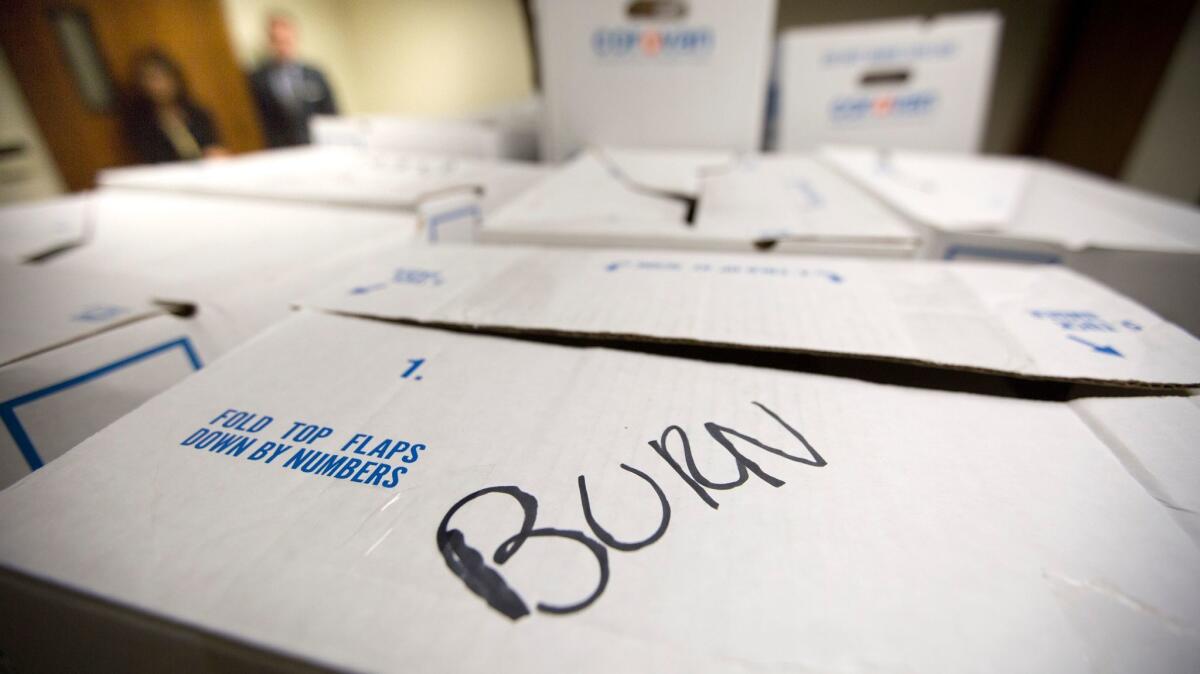L.A. reaches settlement with First Amendment Coalition over retaining public records

- Share via
A legal battle over records tied to former Los Angeles City Councilman Tom LaBonge has ended with the city reaching an agreement on retaining city documents.
The Los Angeles City Council voted 12 to 0 on Wednesday to approve the settlement with the First Amendment Coalition, a group that advocates for open government. The organization sued the city last year after it requested a range of emails and letters involving LaBonge and came up empty-handed.
The lawsuit accused L.A. of flouting the California Public Records Act and improperly destroying records. California generally allows city governments to destroy some records if lawmakers and the city attorney approve, but not if the documents are unduplicated and less than 2 years old.
Under the agreement announced Wednesday, the city will pay the group $20,000 to cover its legal fees, agreed that California Government Code section 34090 does not allow the destruction of records less than 2 years old, and must notify the organization during the next five years if it stops requiring records to be retained for at least two years.
“This is a victory for the people of Los Angeles,” said David Snyder, executive director of the First Amendment Coalition. “This settlement will ensure that the city is living up to its obligations, under California law, to hold on to records. … If a government agency can simply destroy records immediately after they’re created, the public right to access records is meaningless.”
“What happened when LaBonge departed should not happen again,” Snyder said.
Rob Wilcox, a spokesman for City Atty. Mike Feuer, said in a written statement Wednesday that “this settlement reinforces the city’s commitment to transparency.” LaBonge, who was not named as a respondent in the suit, said Wednesday that he was “glad it’s been resolved.”
The former councilman added that he had routinely provided historic material to be saved in city archives.
The allegations in the lawsuit revolved around the fate of documents when LaBonge left office. City records indicate that as he cleared out, LaBonge staffers sought to destroy more than 100 boxes of material.
Dozens of boxes marked for destruction were later recovered and thrown open to the public by his successor, Councilman David Ryu, who allowed reporters and residents to page through reams of salvaged documents that included planning files, travel receipts and letters from the public. It is unclear whether other boxes were thrown out, according to city records officials.
LaBonge denied that any public records had been destroyed, said no one had instructed him to save anything, and argued that any important documents would be available from other city departments.
In the wake of news coverage of the controversy, the First Amendment Coalition requested emails, letters and memos sent or received by LaBonge regarding the Department of Water and Power, the California Film Commission or the Il Villaggio Toscano housing development during 2014. It sought the records from Council President Herb Wesson, whose staff responded that their office had no such records.
The city rejected the allegations raised by the First Amendment Coalition in a court filing earlier this year, saying it had “acted in good faith.”
It also argued that the First Amendment Coalition was legally precluded from raising issues about its request because it had failed to promptly follow up to find out if the city — not Wesson’s office specifically — had the documents.
Last year, city officials approved new schedules for retaining and disposing of records for City Council offices, including guidelines for council members leaving office. Ryu, who pushed for the rules, said the move “advances our intent of rebuilding trust in our local government.”
Snyder said that the settlement also requires some specific language “that makes it expressly clear that the city is required to retain all of its records for at least two years.”
Twitter: @LATimesEmily
UPDATES:
2 p.m.: This article was updated with additional details of the agreement.
This article was originally published at 12:50 p.m.
More to Read
Sign up for Essential California
The most important California stories and recommendations in your inbox every morning.
You may occasionally receive promotional content from the Los Angeles Times.














